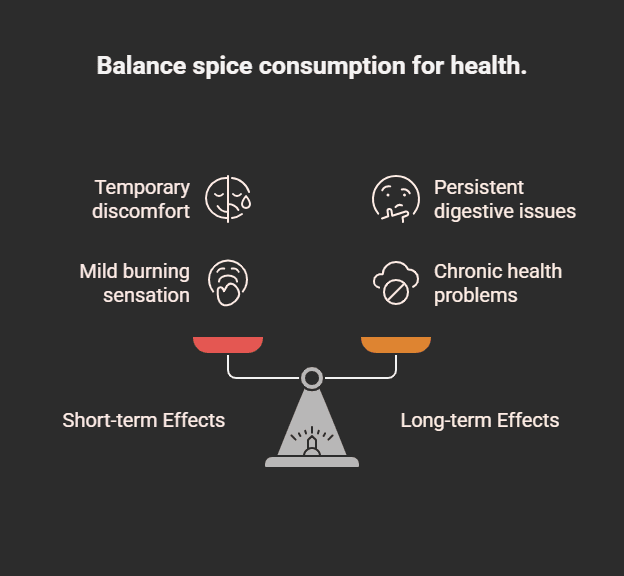Spicy food enthusiasts tend to enjoy the pungency and the added zing of heat in their food. But what is the consequence of eating too much spicy food? Although spices such as chili peppers, black pepper, and hot sauces add flavor to meals, excessive consumption of these might produce some surprising reactions in your body. Ranging from gastrointestinal distress to possible long-term health effects, it is important to know the effects of overeating spicy foods.
In this article, we will see what happens when you consume excessive spicy food, how it impacts various parts of your body, and how to indulge in it safely without harm.
Why Do Spicy Foods Affect Your Body?
Let’s first understand why spicy foods trigger such powerful reactions in your body before getting into the effects. The burning in hot foods results mainly from capsaicin, a substance in chili peppers. When you consume spicy food, capsaicin acts on pain receptors in your digestive tract and mouth. The pain receptors, which are TRPV1 receptors, are also what sense heat and pain. Your brain then registers the interaction between capsaicin and the receptors as burning, even though no heat exists.
Your body then responds as if it is confronting something harmful, causing a variety of physiological reactions. Although an adequate amount of spicy food is healthy, excessive consumption can result in a variety of issues.
Immediate Effects of Consuming Too Much Spicy Food
1. Burning Feeling in the Mouth and Throat
One of the most obvious effects of eating too much spicy food is the intense burning feeling in your mouth and throat. This happens because capsaicin irritates the mucous membranes.
- How to relieve it: Drinking milk, eating yogurt, or consuming bread can help neutralize the burning sensation. Water alone won’t work, as capsaicin is not water-soluble.
2. Excessive Sweating and Flushing
Ever wonder why you begin sweating when you’ve eaten a hot meal? Capsaicin causes your body to increase in temperature, which in turn activates a process known as gustatory sweating.
- It tends to occur on the face, scalp, and neck.
- It occurs because capsaicin acts on nerves that stimulate your sweat glands.
3. Stomachache and Acid Reflux
Too much spicy food can irritate the lining of your stomach, causing discomfort and digestive problems such as:
- Stomach aches: Capsaicin produces irritation, bringing about a burning sensation in the stomach.
- Acid reflux (heartburn): Spicy meals can unwind the lower esophageal sphincter (LES), permitting the stomach acid to move back towards the esophagus. A burning sensation within your chest develops.
- Who’s most vulnerable? Individuals with acid reflux disease, ulcers, or gastritis need to be aware of spicy food, as this can exacerbate symptoms.
4. Nausea and Vomiting
If you eat an excessively large quantity of spicy food, your body may reject it entirely. This can lead to:
- Nausea: Irritation of the stomach may cause you to feel nauseous.
- Vomiting: In severe cases, the body may attempt to eliminate the irritant by causing vomiting.
Digestive Problems Due to Eating Too Much Spicy Food
5. Diarrhea and Stomach Cramps
Capsaicin not only irritates the stomach but also accelerates the digestion process. This can cause:
- Diarrhea: The intestines become tighter, slowing water absorption, which results in loose stools.
- Stomach cramps: Irritation can trigger painful cramping, particularly for individuals with delicate digestive systems.
- How to prevent it? If you enjoy spicy food but suffer from stomach troubles frequently, consume it with foods that are rich in fiber or milk to ease irritation.
6. Hemorrhoid Flare-Ups
If you have hemorrhoids, excessive spicy food can make symptoms worse. Spicy food irritates the anal canal and makes bowel movements more painful.
- Tip: When you have hemorrhoids, keep your consumption of very spicy food to a minimum to spare unnecessary discomfort.
Long-Term Impact of Chronic Consumption of Excessive Spicy Food
Occasional spicy meals are harmless in most cases, but frequently overindulging your body with excessive levels of spice in your diet may have long-term health implications
7. Risk of Gastritis and Ulcers
It is a widespread belief that spicy foods lead to ulcers in the stomach. Though capsaicin itself is not the reason for ulcers, regular excessive intake may trigger gastritis (stomach lining inflammation), which may also raise the chances of developing ulcers, particularly in Helicobacter pylori-infected individuals.
8. Effect on Taste Buds
Consuming excessive amounts of hot food over time will desensitize your taste buds. What that means is that you’ll have to consume more and more of it to reach the same degree of satisfaction.
- That may render you less sensitive to other tastes, such as sweetness or saltiness.
Possible Connections to Health Benefits (and Risks)
Curiously, research indicates that spicy food may provide health benefits if consumed in moderation, including:
- Increasing metabolism: Capsaicin has a modest effect on increasing calorie burn.
- Decreasing inflammation: There is some evidence that capsaicin has anti-inflammatory effects.
- Alleviating pain: Capsaicin is employed in topical creams to ease pain in joints.
Still, an excess of it might result in ill effects like indigestion and possible irritation to internal organs.
How to Eat Spicy Food Safely
If you are fond of eating spicy food but don’t desire its ill effects, follow these tips:
- Start Slow – If you’re not used to spicy food, gradually increase your spice levels instead of jumping straight to extremely hot peppers.
- Pair it with Cooling Foods – Dairy products like yogurt and milk can help neutralize capsaicin.
- Drink the Right Beverages – Avoid water; instead, drink milk or eat starchy foods like rice or bread.
- Be Aware of Your Body’s Response – If you often have digestive problems, attempt to cut back on your consumption.
- Don’t Eat Spicy Food at Night – Eating spicy food at night can lead to acid reflux and poor sleep.
Last Thoughts: Should You Be Concerned About Consuming Too Much Spicy Food?

So, what can happen if you overindulge in hot food? Generally, the results are short-term, anything from a burning taste to gastrointestinal upset. But persistent and excessive ingestion can cause long-term digestive issues, particularly among individuals with conditions such as acid reflux, gastritis, or irritable bowel syndrome. Spicy food can be a wonderful addition to your diet when consumed in moderation. Provided you listen to your body and balance your consumption, you can keep on enjoying that added kick without the unpleasant side effects!
Are you a spice enthusiast? Have you ever felt any of these effects? Share your experience in the comments!








